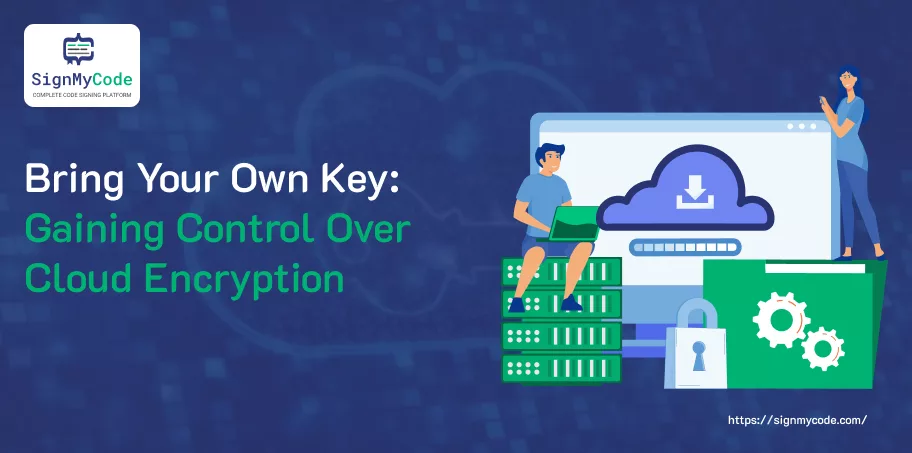Bring Your Own Key (BYOK) Explained: Gaining Control Over Cloud Encryption

Introduction
Data safety has become a primary issue for business organizations of any scale as they move to cloud computing. With businesses using cloud services to save and run critical information, the development of confidence encryption and essential management techniques is paramount.
Several security methods have become popular; bring your own key (BYOK) is among them. It is a powerful function that keeps your data highly secure by letting you operate cloud services securely while taking control of all your encryption keys.
This all-encompassing article will show how BYOK works in the cloud, why it is the most significant security option, what benefits it offers, and the factors that organizations must consider when implementing this key encryption technology.
To be clear, whether you are a seasoned IT professional or a business leader striving to strengthen your cloud security posture, this article will thus provide the fundamental concepts you need to properly know BYOK and its role in the ever-shifting cloud environment.
What is Bring Your Own Key (BYOK)?
BYOK (Bring Your Own Key) helps organizations carry forward their own cipher keys rather than relying on the default encryption keys offered by the cloud service provider alone.
With BYOK, organizations create and administrate their encryption credentials in the local network or in a protected key management system and then directly import them into the cloud domain.
Using such an approach, organizations are provided with one more means of securing and controlling their data located within or outside the company. The organization can bring the keys used for the encryption and decryption of its confidential information located in the cloud and take responsibility for them.
By preserving crucial ownership, organizations can ensure that only those with permission to access the keys are given this power, and the possibility of data leakage or breach is reduced.
Benefits of Bring Your Own Key (BYOK) for Data Security
Enhanced Data Security:
With BYOK, organizations enjoy greater data security levels since they run the same keys that protect their data hidden in the cloud externally.
Data confidentiality is achieved by encrypting all data in the journey from the client to the cloud service provider and vice versa. This control mitigates risk by guaranteeing that data in the public cloud cannot be decrypted and accessed.
Compliance and Regulatory Adherence:
For a range of businesses, regulatory governments, and entities, including data protection and encryption, particular requirements are set.
BYOK enables Organizations to comply with regulatory requirements by holding keys under their control and only permitting the use of encryption keys originating within the confines of that organization’s trusted environment.
Key Lifecycle Management:
BYOK allows the organization total management authority over every stage of the encryption key life, specifically key generation, rotation, revocation, and destruction. This realization of control allows the organization to develop and implement key-management practices corresponding to security policies and industry trade practices.
Separation of Duties:
BYOK delineates the function between the organization and the cloud service vendor, which makes it easy for an organization to enforce controls.
Whereas the organization holds the keys with encryption as a core function, the CSP manages the cloud infrastructure to provide the necessary services, enabling a clear definition of authority and reducing the risk of unauthorized access or misuse.
Data Portability:
By applying the encryption key for their own use, organizations can more easily transfer their data back and forth from one cloud service provider to another or to their on-premises platform.
More importantly, this data portability frees organizations from vendor lock-in, offering a company more control and flexibility over its data and cloud architecture as well.
Critical Considerations for Implementing BYOK:
While BYOK offers numerous benefits for cloud security, organizations must carefully consider several factors when implementing this encryption strategy:
Key Management Infrastructure:
Organizations require robust infrastructure to enable the generation, storage, and secure management of crucial encryption. They often use HSM and KMS or introduce secure key management practices within their external environment.
Key Import and Export Processes:
Bringing and keeping encrypted keys inside and outside the cloud that must be handled securely is essential for successfully implementing the BYOK model.
The organization must follow strict security protocols. They should be by the guidelines of the cloud service provider in terms of import and export key processes in support of the encryption key, which should remain secure and confidential.
Access Controls and Auditing:
Building access control and implementing adequate auditing whenever dealing with encryption keys under organizational control is a must. This is known as least access privilege, and policy enforcement of least privilege requires separate access logging for the key management operations.
Cloud Service Provider Support:
Unlike with every cloud service provider, the BYOK functionality may not be available at all, and even when it’s available, providers may present various BYOK implementation methods or requirements.
CSPs might differ in support for on-premises key management and in features necessary to align with current organizational key management infrastructure and security policies, so businesses must proceed delicately in this regard.
Training and Awareness:
An effective BYOD implementation can only be carried out if there is a comprehensive training and awareness program for IT staff, security teams, and other relevant parties to ensure its success. Our aim is to clarify that all parties realize the significance of precision key management, security requirements, organizational policies, and supervisory measures on BYOK.
BYOK Implementation in Major Cloud Platforms:
Although the techniques described in the BYOK concept stay constant on cloud platforms, each major cloud service provider implements the process uniquely with its own constraints and particularities.
Let’s explore how BYOK is implemented in some of the leading cloud platforms:
AWS Bring Your Own Key (BYOK):
The AWS (Amazon Web Services) BYOK tool allows customers to import their keys directly to the KMS (AWS Key Management Service).
AWS offers an in-depth reference guide and ports to securely import and manage encryption keys properly in AWS’s cloud environment.
Microsoft Azure Bring Your Own Key (BYOK):
Among other features, Azure’s BYOK capability enables organizations to upload and manage their own encryption keys to Azure Key Vault, a cloud-based key-management service.
Recommended: Azure Key Vault Key Management Guide
Azure BYOK supports several types of keys, including RSA and Elliptic Curve Cryptography (ECC) keys. It provides integrations for encryption services such as Azure Data Share and Data Lake.
Google Cloud Bring Your Own Key (BYOK):
GCP, on the other hand, provides BYOK capability through its Cloud External Key Manager—a service that allows organizations to store their encryption keys, either using third-party key management systems or on-premises HSMs.
Recommended: How to Configure Google CloudHSM to Sign Windows Executables?
GCP accommodates a set of significant and provides GCP services integration for data encryption.
IBM Cloud Bring Your Own Key (BYOK):
IBM Cloud also offers its solution for BYOK, which is implemented through Hyper Protect Crypto Services and Hyper Protect Virtual Server services. Organizations that may be importing and managing encryption keys within the IBM Cloud environment can utilize secured enclaves and hardware-based key protection.
Oracle Cloud Bring Your Own Key (BYOK):
BYOK is supported in Oracle Cloud Infrastructure (OCI) through a service called key management. Organizations can import and manage their keys in the OCI environment.
Recommended: How to Configure Oracle Key Vault to use Luna HSM?
Oracle BYOK handles all or most key types and enables various connectivity points with other Oracle OCI services for data encryption.
Conclusion
Using organization private keys, due to the ownership and control BYOK feature gives, provides a strong defense against data breaches, unauthorized access, and compliance violations.
Despite the complexity of the BYOK implementation and observance of guaranteed security precautions, the service is still a very effective cloud security solution that can provide users with data protection, due compliance with regulations, key lifecycle management, and smooth data migration to another provider.
The cloud adoption phenomenon indicates an upward trend, which should instill in organizations a boost to reinforce their positions in the digital landscape, protecting their most treasured assets as the networking space keeps growing.
Frequently Asked Questions
What is the Primary Benefit of implementing Bring Your Own Key (BYOK)?
This method benefits all decision-making rights regarding the encryption keys, protecting data saved on the cloud, improving data safety, and prohibiting unauthorized data access.
Which Major Cloud Platforms support BYOK?
Leading cloud service providers, such as AWS, Microsoft Azure, GCP, IBM Cloud, and OCI, offer a BYOK feature, which allows organizations to control their encryption keys stored within the owner’s cloud environment.
How does BYOK differ from using the Cloud provider’s Default Encryption Keys?
Under the “Bring Your Own Keys” approach, organizations will have the authority to master their encryption keys. They can produce and manage keys only in a trustful environment. In contrast, while the cloud provider’s default keys convey control and management of the provider, the administrator might not secure and manage the keys.
Can BYOK be used On-premises or in Hybrid Cloud Setups?
It is possible to implement BYOK, which can be used within on-premises environments as well as hybrid cloud setups, but the organization must use its on-premises key management infrastructure to keep the data safe across multiple cloud and on-premises environments.


